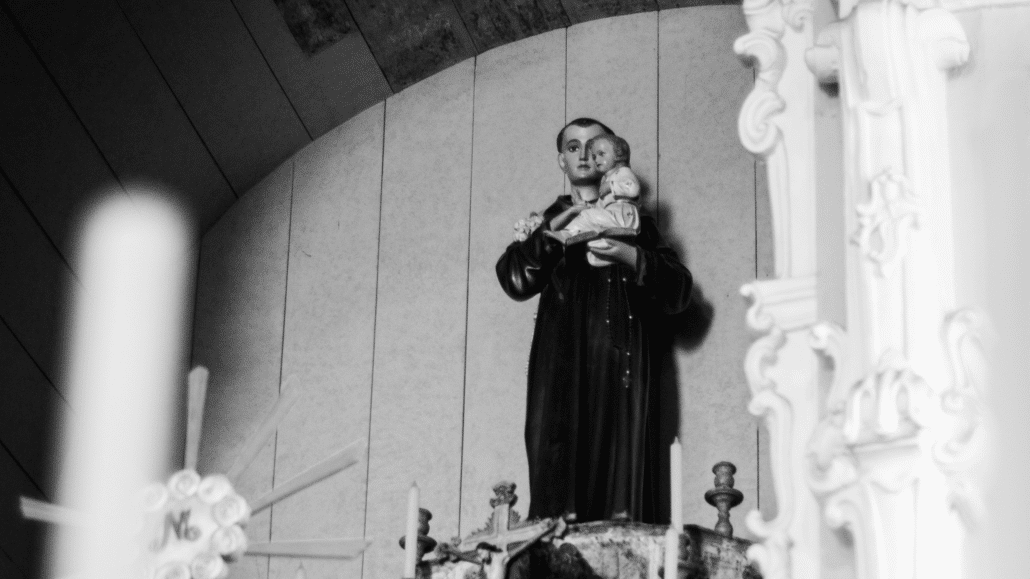Saint Anthony of Padua is a name that conjures up many ideas and images: some factual, some the stuff of legends, some just plain silly. But doesn’t that attest to his importance as a saint? Only the saints can have that kind of an effect on people’s thinking. They tend to be bigger than life, and that’s what their stories are all about—men and women who are bigger than life, and who passionately love the Lord.
When I was a child, there were three devotional practices I could count on in my family and among friends. We all had a statue of Saint Francis in a birdbath somewhere in the yard, we all prayed to Saint Anthony when we lost something, and we all prayed the rosary every day. These religious observances almost defined us as Catholics. I grew up knowing that Saint Francis loved animals and Saint Anthony was very good at finding lost articles. And that’s about all I knew of either one of them.
When I entered formation as a Franciscan, I began to appreciate the depth and wisdom of Saint Francis. I reasoned that if I was going to profess vows as a member of his community, I had better learn what he is all about. And the more I learned, the more there seemed to be to take in.
Saint Anthony was still the one to turn to if I lost something. There wasn’t much development and, to be honest, being required to attend awful Saint Anthony devotions as a student didn’t help.
So, I approached adulthood with neutral feelings at best, and little or no real knowledge about Saint Anthony of Padua. (And to make matters worse, my middle name is Anthony—he’s one of my patrons!).
As an adult priest, however, I began to learn that there was a lot more to Saint Anthony. He was also a great teacher and preacher. I have grown to appreciate a little bit more about the man who is probably the most popular Franciscan to ever live—maybe even more so than Saint Francis himself.
But that didn’t mean I had to give up the image of the “saint of the birdbath” and the “finder of lost articles”—it’s just that I learned there’s a whole lot more to these men than those simplistic labels imply.
Saint Anthony’s Origins
Fernando Martins de Bulhões was born in Lisbon, Portugal in 1195. Therefore, Saint Anthony, as we know him, was Portuguese, rather than Italian.
At age 15, he joined the Congregation of Canons Regular of Saint Augustine and lived in the monastery in Coimbra, in west-central Portugal. Young Fernando would have known of the Franciscans—whom Francis had founded when Fernando was only about 10 years old—because they had come to Coimbra to live and beg in the city marketplace.
Most of the people were edified by the friars’ poverty and simplicity, but it was their going to the missions that truly impressed them. It was in 1219 that some went to preach the word in Morocco. Their enthusiasm, however, met with martyrdom and a sea merchant brought their remains back to Coimbra in apparent defeat.
Fernando, however, was deeply impressed by the courage of these men, and pestered his superiors to allow him to fulfill his desire to be a martyr and to join the Franciscan Order. They finally gave in and he moved to join the Friars in Coimbra, and actually was allowed to go to the missions in Africa. (It was when he joined the friars that he took the name Anthony.) His missionary life was short-lived, however, as he took sick and had to return home.
On his way back, his ship was blown off course and he ended up in Sicily where the Friars took him in, even though they didn’t know him. It was from there, in May 1221, that he went to the Pentecost Chapter of Mats in Assisi and possibly met Saint Francis. But he still needed time to regain his strength, and so was assigned to basic household tasks within the friaries of Italy.
His True Talents
One day, as the story goes, there was an ordination of fellow friars and the preacher fell ill. No one wanted to preach for the occasion, so Anthony was picked for the task. He was asked to give just a “simple reflection.” That, however, began a whole new chapter in his life, for Anthony had not let the friars know about his theological education with the Augustinians. (I guess major superiors didn’t communicate among themselves like they do today or send letters of recommendation.)
But it wasn’t only his theological insights that impressed his listeners, it was also his holiness. When Saint Francis heard of Anthony’s hidden abilities, he assigned him to be a preacher.
But that wasn’t all. Saint Anthony had the knowledge and the ability to preach, but the common folk wanted a more authentic witness from their preachers. They wanted the preacher’s life to match his words. They wanted authentic Gospel living, and they found what they were looking for in Saint Anthony.
The ‘Hammer of Heretics’
While Anthony chose a “soft approach” to those outside the faith—not denouncing them, but attempting to convert them—his preaching was effective. So much so, that he was given the title the “Hammer of Heretics.” As his reputation spread, Saint Francis heard more about him and asked him to teach the friars, which he did, beginning at the friary in Bologna.
Eventually, Saint Anthony’s preaching and teaching took him to Padua. There, he preached and taught with great success. But he still had a strong contemplative streak running though his spirit, and he often went to La Verna—the place where Saint Francis received the stigmata—to pray in the quiet of a grotto.
Perhaps Saint Anthony preached his most famous series of sermons during Lent of 1231, shortly before he died. Exhausted from the experience, he wanted to return to Padua, and was on his way there when he took sick and died at the age of 36 at Arcella. He had been a Franciscan for only 10 years. Impressed with the many miracles that took place at Saint Anthony’s tomb, Pope Gregory IX declared him a saint within a year of his death.
Not Just a Finder of Lost Objects
While becoming a Franciscan helped me develop an image of Saint Francis beyond that of “saint of the birdbath,” learning about Anthony and reading his writings impressed me with his holiness and intellectual abilities. He was a truly smart, well-educated, holy friar who lived what he preached and preached well and effectively. I found he was more than the “finder of lost articles.” He was a theologian, teacher, and holy religious as well.
But that leaves out one important factor that plays a major role in popular devotion to the man. Saint Anthony is a powerful intercessor. His care and prayers for others often lead to powerful results which have become the subject of many legends and stories. As every devotee of Saint Anthony devotions knows, the petitions and thanksgivings offered to the saint run the gamut of personal and familial needs satisfactorily addressed, as well as healings and conversions.
As Julian of Spires wrote: “The sea obeys and fetters break/And lifeless limbs thou dost restore/While treasures lost are found again/When young or old thine aid implore.”
As the Solemnity of Saint Anthony arrives once again this year, I want to celebrate his life as a famous member of our Franciscan family who was known for his holiness, wisdom, teaching, preaching, and intercessory influence with the Lord he loved so deeply. I have many needs and I know that I can turn to him for inspiration and help. He is definitely a Franciscan we can all look to and emulate—and still ask for help to find lost articles.








